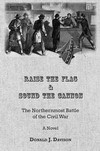
Raise The Flag And Sound The Cannon
Donald J. Davison
Shoreline Press
$22.95
paper
260pp
978-1-896754-63-5
This is how that wild event is described: “He concluded that [“Doc” Rumsey] must have some medical knowledge so he enlisted him at gunpoint.”
Once we catch our breath, we are told the hero’s reaction. “‘I’m not a doctor,’ Rumsey complained, but it was too late. No one was listening to him. All Young wanted was action, not words, at this point.”
It’s an apt metaphor for the writing in this frustrating book. Frustrating because the tale is a hoot. Confederates smuggle what they believe is Greek Fire into town in bottles labelled “Chickamauga Spiritual Elixir,” then use it to rob Vermont banks. It’s their revenge on Unionists and a way of helping the Southern cause. Besides the excitement of the story, the actions of the players raise all kinds of dilemmas. Is bank robbery by soldiers a military or criminal action? Do the arrested robbers belong to Canada where they fled, or America? And what to do with a kidnapped quack who has illegally crossed the border?
Yet even at gunpoint, Davison doesn’t give us action, only more words. In skirting the border between fiction and non-fiction, he has succumbed to the greatest risk of fictionalized history. The story goes into a coma when too much information clogs its arteries. Davison’s book is in an embarrassing need of a diet. Look no further than the first paragraph a potential reader would scan:
Rumsey stepped off the gangplank of the steamship that brought him across the Atlantic, feeling relieved that he was once again walking firmly on solid ground after a month at sea. John felt a wave of excitement rush over him as he took in his new surroundings. This sense of elation did not last, however, as the cruel realities of life once again set in.
Three clichés (walking on solid ground, a wave of excitement, and the cruel realities of life) crowd the paragraph. But the real letdown is that there is only overcooked exposition and narrative summary to awaken our appetite for the story. Davison gleefully ignores the only secret a writer need ever discover: show, don’t tell.
Readers of novels don’t want to be told a story. Readers want to be the story. We don’t want to be told Rumsey is relieved; we want to stand beside him as he sighs and stomps his feet on New World dirt – and maybe catch a hint of his troubles to come.
Or Davison could begin his novel where the story begins, way out there on page 92, and he could show us how a good-hearted charlatan deals with blood on his hands.
The clogging of information is the most obvious of the book’s shortcomings. But we also lose a main character while we follow secondary characters for chapters at a time; there is no antagonist blocking Rumsey’s path; and the dialogue is stilted because it is always expository:
“Thompson whispered, ‘My God, this can’t be the young officer from General Morgan’s 8th Kentucky Calvary that Secretary Mallory wired me about.'”
Well, yes in fact it is, Thompson. Later too, we are told that Chester the dog “didn’t say a word.” Really? Perhaps if Chester had been the narrator… mRb






0 Comments